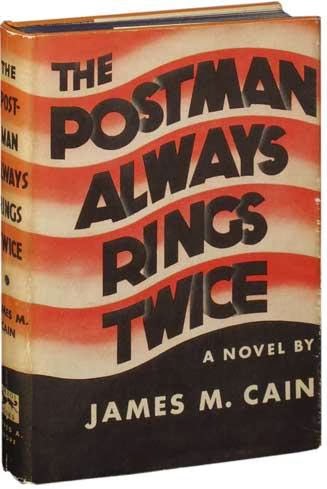It is important for a writer to look back at the great
novels of the past century. Shrug off the usual mix of troubled souls fighting
for truth and justice (Reacher, Bosch, Ryan, etc.), and revel in the evil that
dwells in the hearts of men, especially when they sit on death row, waiting for
the minister. Such is James M. Cain's noir piece The Postman Always Rings Twice.
No more amoral characters could ever have been created as Cain's Frank Chambers
and Cora Papadakis.
First of all there is no postman. Not anywhere in the story does the Postal Service come into play, but the title may have its literary roots in a true crime story of one Ruth Snyder who, like the Cora in the book, conspired to kill her husband in the late 1920s. All in an attempt at an insurance setup that Snyder hoped to perpetrate. But there are other explanations that deal with Cain's later recollection that it was a result of a conversation with the screenwriter Vincent Lawrence at the time of the writing. If a book title can cause deep philosophical discussions wouldn’t every writer try and discover such an existential title for their story?
First of all there is no postman. Not anywhere in the story does the Postal Service come into play, but the title may have its literary roots in a true crime story of one Ruth Snyder who, like the Cora in the book, conspired to kill her husband in the late 1920s. All in an attempt at an insurance setup that Snyder hoped to perpetrate. But there are other explanations that deal with Cain's later recollection that it was a result of a conversation with the screenwriter Vincent Lawrence at the time of the writing. If a book title can cause deep philosophical discussions wouldn’t every writer try and discover such an existential title for their story?
The book was published in 1934 to critical acclaim, derision, hatred, moral outrage, a banning in Boston (wasn't everything?), and great success for the author. Cain would go on to write Double Indemnity and Mildred Pierce, two other strong and tough books on deceit and cunning (and as in the case of Mildred Pierce the creation of a feminist hero). A prolific writer and screenwriter, he had little commercial success after the late 1940s. He died in 1977 at the age of 85.
The prose is crisp, dry, and bare, much like the setting for much of the story: the out-lands of the Los Angeles basin of the 1930s. Frank Chambers, by even his own account in this semi-first person narrative and recollection, is a bum. He stumbles on a diner run by an older immigrant Greek who has a young wife with "other" things on her mind, like taking over the diner and making it something. After colluding with Chambers, the two lovers decide to remove the biggest impediment to their scheme, the Greek. After a failed murder attempt, hospitals, police, and eventual success of their scheme (the murder of the Greek after a car accident), they are exonerated through the shenanigans of a shady lawyer. But justice does come and Cora pays with her life in another car accident (contrived – but just), and Frank is convicted of intentionally murdering her (though this time it was an accident), the book is his explanation of how he was innocent of her death. He hopes, as we waits on death row, that his story will someday be published; his hope is like most authors today.
The story is haunting and stays with you. You can taste the diner and the grease, and heat, and the dust. You can also viscerally feel the total guile of the two as they plot the murder. They are two lost souls that really don’t care. It is all about the money and the good times. Nothing and no one will stand in their way.
It's available everywhere as an ebook and pbook; in some versions it's less than a hundred pages.
More later . . . . .
. . .


No comments:
Post a Comment